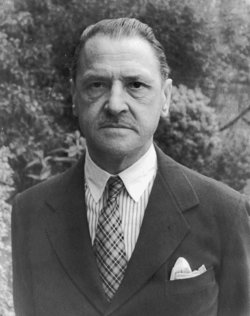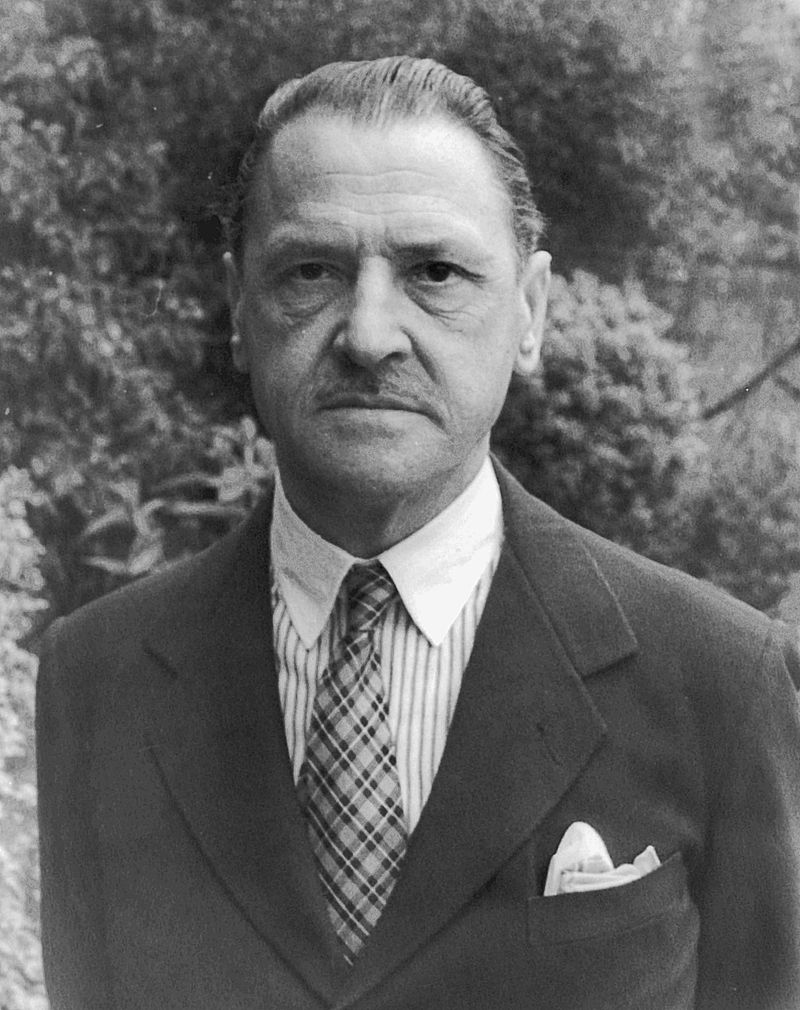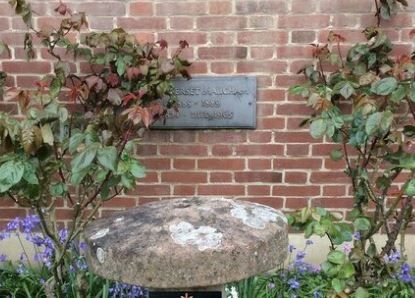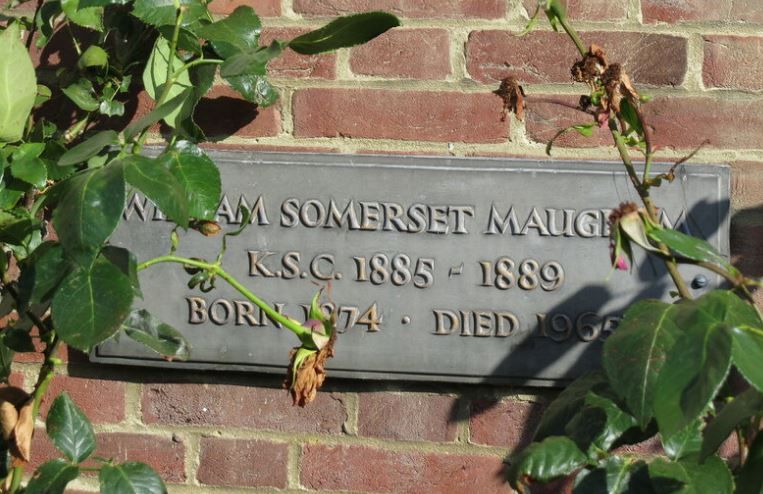Author. He was a British author of 24 novels, 24 plays, and numerous collections of short stories. He is best remembered for his novels "Of Human Bondage" and "The Razor's Edge." He was born William Somerset Maugham at the British Embassy in Paris, France where his father was a lawyer who handled England's legal affairs in Paris. By the age of ten, he was orphaned, his mother had died from tuberculosis and his father from cancer. He then went to live with his uncle, Henry MacDonald Maugham, who was the Vicar of Whitstable in Kent, England. He attended King's School at Canterbury from 1885-1889. His next few years were difficult as his uncle was cold and emotionally cruel and he was bullied at school for his short stature, his stammering speech, and since French was his primary language, his poor English. When he was 16, his uncle sent him to Germany to attend Heidelberg University. While there, he wrote his first book, a biography of opera composer Giacomo Meyerbeer. Upon his return to England, his uncle sought to find suitable work for him. His father and older brothers were all renowned lawyers but he declined to follow in their footsteps. At his uncle's insistence, he studied medicine at Saint Thomas' Hospital in Lambeth, London, England. In 1897 while studying for his medical degree, he wrote his second book, "Liza of Lambeth," a story of working-class adultery and its consequences, drawing from his experiences as a medical student who performed midwifery work in Lambeth, a South London slum. After the first print sold-out in a few weeks, he abandoned his medical studies to devote to writing. Over the next 10 years, he lived in Spain and the Island of Capri, but never achieved the success of "Liza." In 1907 he broke through with his play "Lady Frederick" and by the following year, he had four plays that ran simultaneously in London. By 1914 he was well-known, with 10 plays produced and 10 novels published to his credit. When World War I started, he was too old to enlist in the military but served as a member of the British Red Cross's "Literary Ambulance Drivers" in France with other well-known writers, including Americans John Dos Passos and E.E. Cummings. During this time, he met Frederick Haxton from San Francisco, California, and they became romantically involved until Haxton's death in 1944. He also wrote one of his best literary works, "Of Human Bondage," while serving in France in 1915. About the same time, he had an affair with Syrie Wellcome, the wife of Henry Wellcome, a pharmaceutical magnate. The couple had a daughter in 1915. After Wellcome filed for a divorce, he and Syrie were married in May of 1917. The marriage ended in divorce 12 years later due to his continued relationship and months-long travels with Haxton. In 1916 he traveled to the Pacific to research his next novel, "The Moon and Sixpence," which was based on the life of the French painter Paul Gauguin. In 1917 the British Secret Intelligence Service, which was later named MI6, asked him to undertake a special mission to Russia, in an attempt to keep the Russians in World War I with the Allies as well as keeping their Provisional Government intact, which all came to an abrupt end when the Bolsheviks took complete power in October of that year. He used his experiences as a "spy" as the basis of "Ashenden: Or the British Agent," a collection of short stories about a gentlemanly, sophisticated, aloof spy. He continued to write, with his significant works being "On a Chinese Screen" in 1922, "The Casuarina Tree" in 1924, "An Appointment in Samarra" in 1933, and "The Razor's Edge" in 1944. His 1927 play ,"The Letter" was adapted to a film for television in 1959. In 1926 he purchased a villa on the Rivera in Nice, France, where he would spend the rest of his life, except during World War II from 1940 to 1944, when he resided in the United States. He moved back to England in 1944, after the death of his companion, Gerald Haxton, remaining there until he moved back to his villa in 1946, where he died in 1965 after finishing three more novels. To date, there have been numerous film and television adaptations of his literary works with a host of talented and popular actors performing in them. In 1947 he established the Somerset Maugham Award, a British literary prize given each year by the Society of Authors to writers under the age of thirty.
Author. He was a British author of 24 novels, 24 plays, and numerous collections of short stories. He is best remembered for his novels "Of Human Bondage" and "The Razor's Edge." He was born William Somerset Maugham at the British Embassy in Paris, France where his father was a lawyer who handled England's legal affairs in Paris. By the age of ten, he was orphaned, his mother had died from tuberculosis and his father from cancer. He then went to live with his uncle, Henry MacDonald Maugham, who was the Vicar of Whitstable in Kent, England. He attended King's School at Canterbury from 1885-1889. His next few years were difficult as his uncle was cold and emotionally cruel and he was bullied at school for his short stature, his stammering speech, and since French was his primary language, his poor English. When he was 16, his uncle sent him to Germany to attend Heidelberg University. While there, he wrote his first book, a biography of opera composer Giacomo Meyerbeer. Upon his return to England, his uncle sought to find suitable work for him. His father and older brothers were all renowned lawyers but he declined to follow in their footsteps. At his uncle's insistence, he studied medicine at Saint Thomas' Hospital in Lambeth, London, England. In 1897 while studying for his medical degree, he wrote his second book, "Liza of Lambeth," a story of working-class adultery and its consequences, drawing from his experiences as a medical student who performed midwifery work in Lambeth, a South London slum. After the first print sold-out in a few weeks, he abandoned his medical studies to devote to writing. Over the next 10 years, he lived in Spain and the Island of Capri, but never achieved the success of "Liza." In 1907 he broke through with his play "Lady Frederick" and by the following year, he had four plays that ran simultaneously in London. By 1914 he was well-known, with 10 plays produced and 10 novels published to his credit. When World War I started, he was too old to enlist in the military but served as a member of the British Red Cross's "Literary Ambulance Drivers" in France with other well-known writers, including Americans John Dos Passos and E.E. Cummings. During this time, he met Frederick Haxton from San Francisco, California, and they became romantically involved until Haxton's death in 1944. He also wrote one of his best literary works, "Of Human Bondage," while serving in France in 1915. About the same time, he had an affair with Syrie Wellcome, the wife of Henry Wellcome, a pharmaceutical magnate. The couple had a daughter in 1915. After Wellcome filed for a divorce, he and Syrie were married in May of 1917. The marriage ended in divorce 12 years later due to his continued relationship and months-long travels with Haxton. In 1916 he traveled to the Pacific to research his next novel, "The Moon and Sixpence," which was based on the life of the French painter Paul Gauguin. In 1917 the British Secret Intelligence Service, which was later named MI6, asked him to undertake a special mission to Russia, in an attempt to keep the Russians in World War I with the Allies as well as keeping their Provisional Government intact, which all came to an abrupt end when the Bolsheviks took complete power in October of that year. He used his experiences as a "spy" as the basis of "Ashenden: Or the British Agent," a collection of short stories about a gentlemanly, sophisticated, aloof spy. He continued to write, with his significant works being "On a Chinese Screen" in 1922, "The Casuarina Tree" in 1924, "An Appointment in Samarra" in 1933, and "The Razor's Edge" in 1944. His 1927 play ,"The Letter" was adapted to a film for television in 1959. In 1926 he purchased a villa on the Rivera in Nice, France, where he would spend the rest of his life, except during World War II from 1940 to 1944, when he resided in the United States. He moved back to England in 1944, after the death of his companion, Gerald Haxton, remaining there until he moved back to his villa in 1946, where he died in 1965 after finishing three more novels. To date, there have been numerous film and television adaptations of his literary works with a host of talented and popular actors performing in them. In 1947 he established the Somerset Maugham Award, a British literary prize given each year by the Society of Authors to writers under the age of thirty.
Bio by: William Bjornstad
Inscription
KSC 1885-1889
Gravesite Details
Ashes buried in rose garden with bronze plaque on the nearby wall with his data.
Family Members
Advertisement
See more Maugham memorials in:
Explore more
Sponsored by Ancestry
Advertisement







